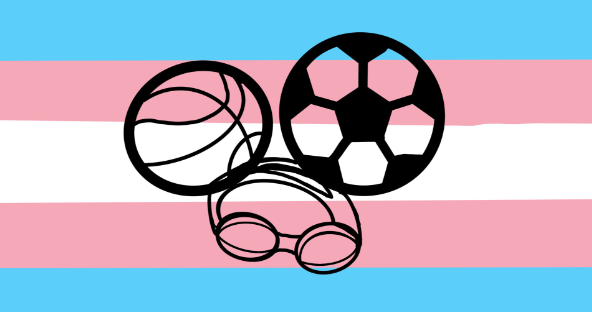Science against sports

Artwork by Canva/Adeline Theophilus
18 states have enacted laws or issued statewide rules that bar or limit transgender sports participation.
May 18, 2023
On March 31, 2023 all the rumors, opinions and speculations came to an end in the Olympics. World Athletics (WA), the governing body for track and field competitions, announced that transgender women, who were once a male, cannot compete in any women’s athletic events.
This policy sparked the attention of the entire nation. Some were furious and felt betrayed by the rule. Others felt a sigh of relief. The news particularly caught the eye of Ph.D. student, Johanna Harper, who is transgender and studies the science behind transgender athletes.
“The idea that it was necessary to ban trans women to protect the female category seems so far-fetched,” said Harper.
Meanwhile, WA claims that they prioritize the safety of their athletes, fairness in competition and “integrity of female competition.” Therefore they applied the rule that no woman can compete in the competitions if they have gone through male puberty. The reason being for this rule is that it is unsafe for the other women competing.
“The decision to exclude transgender women was based on the overarching need to protect the female category,” said WA president, Sebastian Coe.
The issue of transgender athletes being in Olympic swimming has also recently sparked an issue in the nation. Lia Thomas recently swam for the Pennsylvania collegiate swim team. She initially competed with the men’s team for three years. In 2021 they began their career swimming in the women’s division. At one swimming event in particular, the 2022 NCAA swimming competition, the 22-year-old swimmer faced 23-year-old female Riley Gains. Gains has over 10 NCAA titles from swimming in the women’s division. At the competition, they faced off in a 200m freestyle swim. But, a very rare event occurred. Gains and Thomas tied times, down to the millisecond. After the race, Gains was informed that the trophy would be handed to Thomas for publicity reasons.
“I think it’s extremely ironic that the people advocating for this are the same party, the same people who were once advocating for the empowerment of women,” Gaines said.
Another transgender athlete who has been affected by this decision is Halba Diouf. Diouf is a French track athlete who had been training their entire life to compete in the 2024 Olympic games. She ran the 200m sprint, and had recently placed first overall in the Athletics Interclubs competition in Nice, France. The sudden decision to ban trangender athlete in the Olympics affected Diouf’s life forever. She can no longer compete, run and do what they love most in life.
The Olympics’ decision is finalized and most likely will not be overturned. This has affected many individuals’ lives, some for the better, some for the worst.
“We continue to take the view that we must maintain fairness for female athletes above all other considerations,” said Coe.






